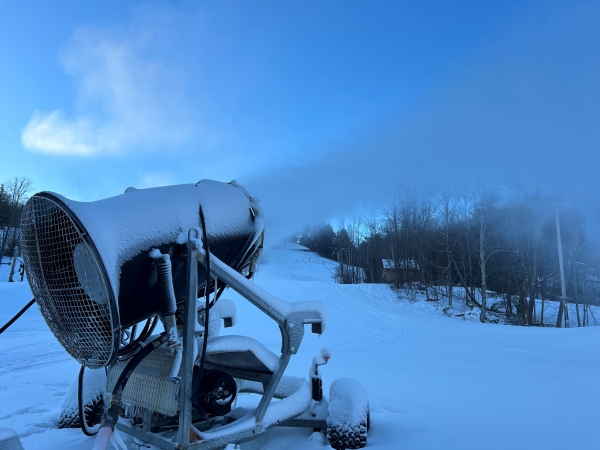
July’s flood hit Vermont’s outdoor recreation economy particularly hard.
The Business Emergency Gap Assistance Program (BEGAP) helped several businesses in this sector, including three ski areas and a snowmobile tour operator and trail network owner. Together they received grants totaling about $865,000.
BEGAP was up and running just three weeks after the July flood. The $20,000,000 program helped businesses and nonprofits that suffered physical damage.
Cochran’s Ski Area
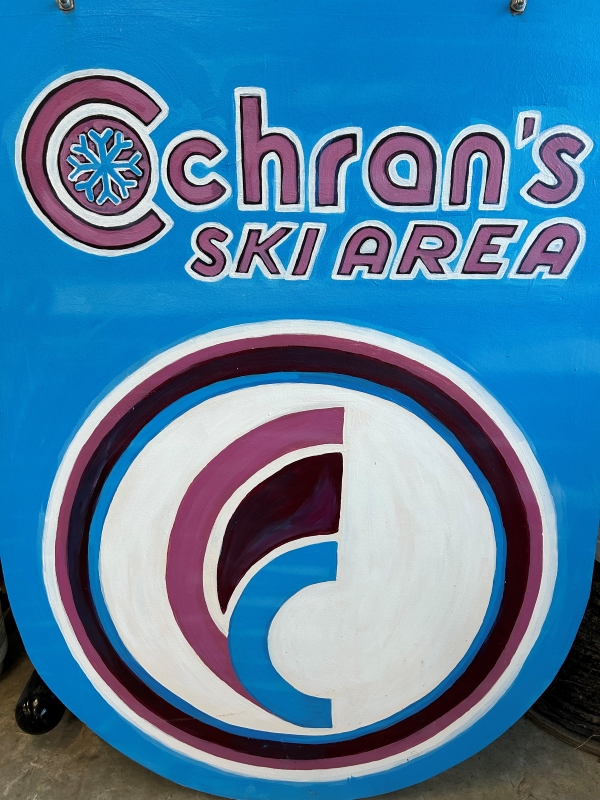 In July, most Vermonters are not thinking about skiing and riding, but Jim Cochran thinks about it 365 days a year. As General Manager of Cochran’s Ski Area in Richmond, he spends his summers making sure the nonprofit is ready for winter by tackling various projects, like working on the rope-tow, repairing Ts from the T-bar, maintaining trails, conducting inspections, and mowing the grounds. But all that work ground to a halt on Sunday July 9, 2023.
In July, most Vermonters are not thinking about skiing and riding, but Jim Cochran thinks about it 365 days a year. As General Manager of Cochran’s Ski Area in Richmond, he spends his summers making sure the nonprofit is ready for winter by tackling various projects, like working on the rope-tow, repairing Ts from the T-bar, maintaining trails, conducting inspections, and mowing the grounds. But all that work ground to a halt on Sunday July 9, 2023.
Cochran’s Ski Area is on one side of Cochran Road. The Winooski River is on the other. Cochran’s snowmaking pump is down along the Winooski. That Sunday night, Jim was concerned the pump would get destroyed by the rising river, so he rushed from home and came up with a way to keep water from entering the pump via the drain. He returned Monday morning to discover it worked. The damage, it turns out, was on Cochran’s side of Cochran Road.
The ski area’s parking lot was wrecked. So was the road to reach it. They discovered damage to the ski hill. And then Cochran heard from his aunt.
“Have you seen the logging road?” she asked him. “It’s gone.”
The Class 4 road is on Cochran's property and hugs the right side of the ski area. Employees use it to drive up to the top. It needed to be completely rebuilt.
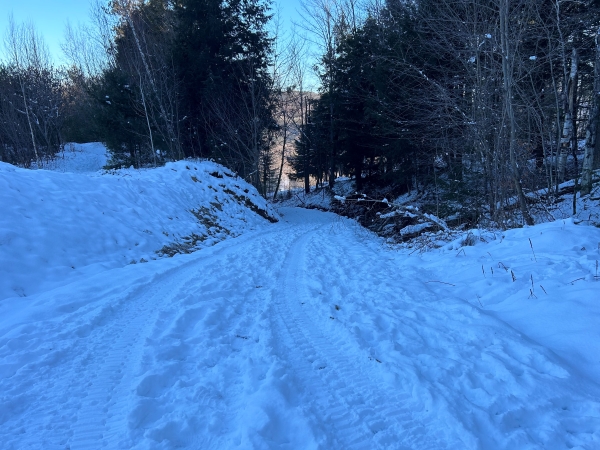
Class 4 road at Cochran's Ski Area rebuilt in time for winter.
Jim says they wasted no time applying for a BEGAP grant as soon as it was available.
“It did exactly what it was supposed to do,” Jim said. “Yeah, it would have been nice to have 100% coverage, but it got us through to where we can have a ski season.”
Thousands of skiers hit these storied slopes each year. This small nonprofit with just a handful of runs boasts 10,000 skier visits each year and sells 700 family passes. And then there is the racing.
The Cochrans are America’s first family of skiing. For decades countless family members have skied at the highest level for Team USA in competitions all over the world. The family’s current star is Ryan Cochran-Siegle who won silver in the Super-G in the 2022 Beijing Olympics.
“That’s inspired a lot of the youngsters around here,” says Jim.
Cochran-Siegle’s mother Barbara Ann Cochran won gold in the Slalom in the 1972 Winter Games. There is a monument celebrating mother and son’s success in the heart of Richmond.

Jim Cochran, General Manager of Cochran's Ski Area.
Jim said he took an 11-year break from the engineering program at UVM to ski on the National Team. He mentioned it so quickly and nonchalantly, this writer didn’t think much of it. Looking him up after the after the interview (not something to brag about either) it turns out Jim was a decorated world class skier winning three U.S. Slalom titles (2004, 2007, 2008) and competing in two Olympics (2006, 2010).
That family legacy draws thousands of people here every year to learn how to ski. Cochran’s sells 300 lesson spots each season and runs after-school programs, including a partnership with the Boys and Girls Club. One thousand kids participate every week in ski club races where they get to push themselves like the family who has devoted themselves to this land and this mission.
“It would be a lot harder to overcome that sort of thing (flooding), if we didn’t have this great purpose of getting kids into the sport of skiing,” admits Jim.
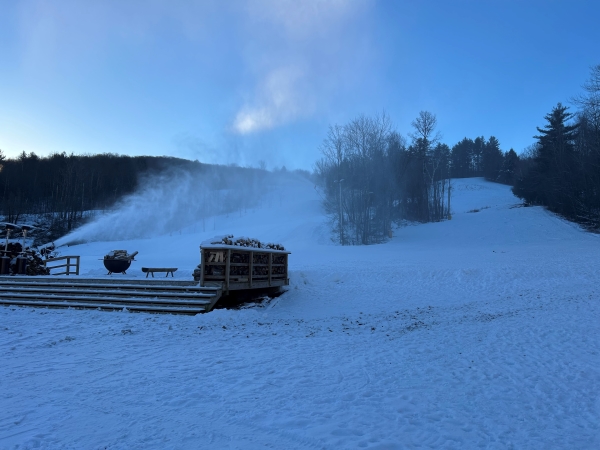
In mid-December the flood repairs were finished and the snow guns were blasting snow in preparation for opening weekend. Then came another deluge.
Jim said the rainstorm on December 18 was like deja vu.
“So much water. We faired pretty well considering. We lost quite a bit of snow but the fixes we made to the (Class 4) woods road, lift line and parking lot this summer held up great and were certainly tested.”
Snowmobile Vermont
MCL Corporation owns Snowmobile Vermont. The company offers snowmobile tours near Stowe, Okemo, Mt. Snow, and Killington. They own about 50 acres of trails. They rely on Class 4 roads and VAST trails, too.
Howard Smith of MCL says their property in Bridgewater and Plymouth got hammered by the July storm.
“We got hit really hard on the east side of Killington,” Smith says.
Trails got torn up. One of their buildings flooded. Bridges were destroyed.

Bridge along Route 100A in Plymouth.
MCL received two BEGAP grants -- $40,000 for damage in Bridgewater and another $37,000 for losses in Plymouth including a washed-out bridge.
“It definitely helped us,” says Smith, “but it was a drop in the bucket.”
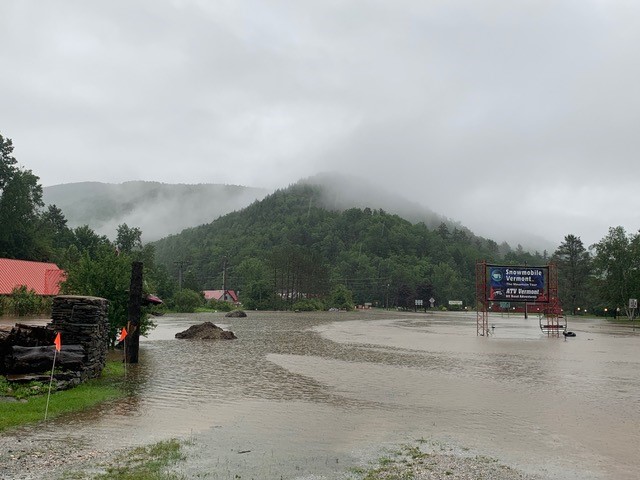
Snowmobile Vermont building, parking lot, and yard flooded on Route 100 West in Bridgewater.
Then came the December rains. Smith says their Bridgewater building flooded for the second time in five months. Many VAST trails were damaged again too, including the ones MCL privately owns.
Magic Mountain
Magic Mountain President Geoff Hatheway says they received close to 8 inches of rain in mid-July. The Londonderry ski area’s silt pond and main snowmaking pond were damaged. They had to remove debris from the water in-take pipe and the in-water pump vault. They had to dredge the snowmaking pond and fix washed out roads and heavily damaged parking lots.

Work to restore a pond at Magic Mountain.
A $265,000 BEGAP grant helped them get to work.
“We wouldn’t be operating at all this winter if we didn’t repair that snowmaking pond. We used BEGAP money to get that going,” says Hatheway. “It was incredibly important to be able to pay some of these bills, especially in the off season. We spend more than we take in in the summer, so to have (grant money) that time of year was really important.”
Rain on December 18 washed away their snow but didn’t destroy their summer repair work. According to their website, Magic Mountain was able to partially reopen for the holiday week starting December 26. They hope to start making snow again December 30 so they can provide skiers and riders with a way down from the summit.
As for Spring 2024, they already have a list of projects to tackle.
“There will be more damage repair next year in addition to what we’ve already done. Lot of on the hill things we couldn’t get to we will be working on in springtime,” Hatheway says.
Killington Ski Resort
Killington Ski Area received a $500,000 BEGAP payout to help recover from extensive damage. The ski area reports their Skyeship and Bear Mountain base lodges were flooded destroying the insides, damaging the buildings’ systems, and wiping out their ski rental equipment.
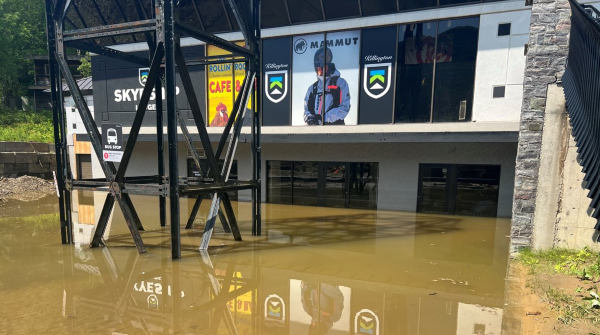
Muddy water floods the Skyeship Lodge at Killington.
The torrent of water eroded parking lots, culverts, and ski trails. The snowmaking pumphouses and wastewater pump station were flooded, buried propane tanks were unearthed and an electrical transformer was submerged and destroyed.
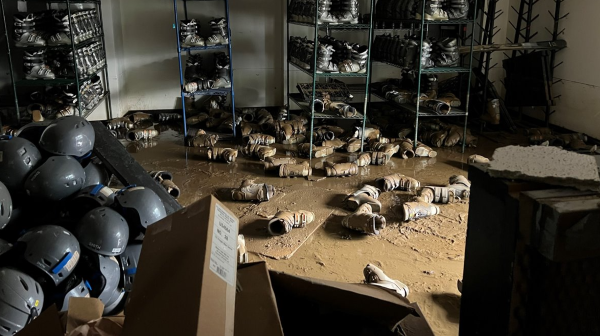
Destroyed rental equipment.
Finance Director Matt Kinsman says BEGAP allowed them to open in time for the start of ski season so that they could contribute to Vermont’s tourism economy.
“Considering the total replacement cost of over $4,000,000 for infrastructure damage, the BEGAP grant played a vital role in kickstarting the recovery process,” Kinsman said.
